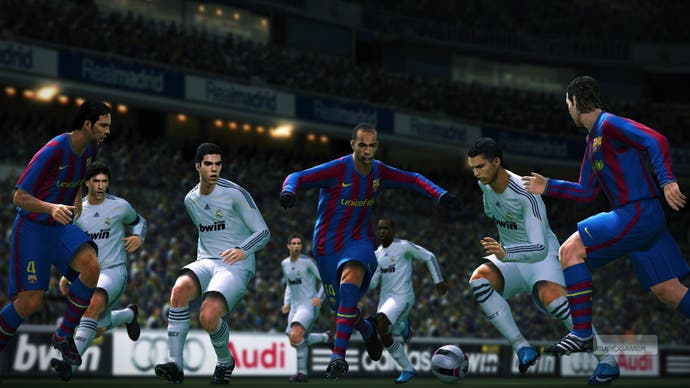PES 2010: Pro Evolution Soccer
The revolution's coming, but not yet.
All the same, PES 2010's improvements are bittersweet in light of the massive distance Konami still has to cover. PES is famous for the scarcity of goal-scoring opportunities, but in 2010 this is frequently becau se of a quirk of the creaking game engine rather than a design flourish: it's relatively awkward to pass the ball around and dribble over short distances (the slow and sideways dribble buttons are no excuse for proper analogue control), changing direction more than a few degrees robs you of too much momentum, and unless you're perfectly set it also takes so long to dig out the average shot that the tracking defender, who may have been behind you for the length of the pitch, will have ample time to get a block in or put you off-balance.
Even so, it's easier to score in other ways. You may not be able to do much on the deck in the penalty area, but long-range efforts and headers from crosses are surprisingly potent, and if you're playing against the AI, you may find that it passes the ball around in its own half with no sense of urgency once you take the lead. That sense of inconsistency is something of a theme: despite improvements in animation, it's a rough and clunky experience in many places, where something as simple as playing a quick pass when receiving the kick-off almost knocks Carlos Tevez on his back, and goalkeepers are achingly slow to distribute the ball. Players also regularly take the long way around to run onto passes, or defenders allow them to do so, stretching your suspension of disbelief to breaking point.

Next to PES 2009, it's still a big improvement all told, but next to FIFA, as it inevitably must be, it's still a poor second choice, losing out in terms of manoeuvrability, player movement and acceleration, simplicity and versatility in control, and - crucially - believability. Yes, you can do some weird things in FIFA 10 if you look them up, but that's nothing next to the baseline obscurantism of PES 2010, which still feels creaky and old-fashioned, despite its myriad improvements, which include more durable online netcode. That's before you get onto the traditional issues PES faces: that it has nowhere near as many licences, and that it's nowhere near as slickly composed or ambitious off the pitch. In the year EA expanded the Be A Pro concept to work across its entire range of modes, PES' Become A Legend feels more isolated than ever.
Long-time Eurogamer readers will know that I've no particular loyalty to either series. I spent years advocating Pro Evolution Soccer because I thought it was better, during which time I kept an eye on FIFA but rarely went near it (with one memorable, 2/10 exception). Last year though, EA Canada made it an easy switch, outgunning Konami in almost every area for the first time. That's not entirely true this year: PES 2010's team management options are a warning sign that the Japanese developer still has some tricks up its sleeve, and people for whom the transition to another football game is simply too much to countenance will buy and enjoy this, and discover it still plays a good, grass-roots game. For everyone else though, up is still down, because FIFA wins again.

